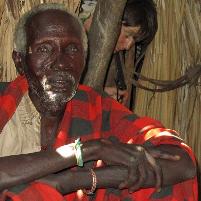Old age constitutes the longest season of a human life. The World Population Ageing Report by the UN Department of Economic and Social Affairs suggests that old age starts at 60 in low-income contexts (including Ethiopia) and at 65 in high-income contexts. This means that a 60-year-old and a 95-year-old could both be categorised as older adults despite an age difference of 35 years. This blog briefly discusses the complex co-existence of ageism and respect for older adults, employing examples from Ethiopia. When we talk about Ethiopia, we are referring to a population of approximately 120 million people (around 7% of which are 60 years and over), almost 110 distinct languages (according to Glottolog), and huge cultural and lifestyle differences between regions (urban versus rural, for example). Thus, there is huge diversity regarding cultural, regional and economic experiences of ageing within the country. My reflections are based on my experience as an Ethiopian (born, raised, and working in Addis Ababa with some visits to rural regions), conducting qualitative research on older adult care in the country, and taking higher degrees in Western Europe.
The condition of older adult care in Ethiopia may be understood as paradoxical. The word ‘care’ is employed here in the broad sense of attention from any part of society (governments, health systems, communities and individuals). On the one hand, there are claims that respect for the older population is a significant part of the Ethiopian culture. However, this claim could be an ideal with the actual practice being otherwise. During interviews for one of my research projects on older adult care in Ethiopia, I recall several non-Ethiopian physicians (from Western Europe) who were working in a hospital in Addis Ababa admiring the sacrifices (such as leaving jobs) some families make to care for their older relatives even when options not to do this were available. However, on the other hand, there are also concerns regarding ageist attitudes and practices in different settings, which have serious implications for the well-being of older adults. For example, at the health system’s level, there are no geriatric wards or departments in healthcare facilities (including tertiary hospitals). In community settings, there are instances of serious older adult abuse and neglect (see studies by Asrat Wolde et al. and Samson Chane and Margaret Adamek. The existence of this situation in a society that prides itself on extending respect to its older adult population may appear somewhat contradictory. Indeed, this contradiction could be the case in other countries too.
There may be possible explanations for this paradox. It is important to point out, however, that paradoxes, contradictions, and ambivalences are often part and parcel of social life. This is due to the diversity of groups, individual perspectives and cultural norms that make up the complex constitution of nations and societies. A more focused explanation could be the cultural, socioeconomic and political changes occurring in Ethiopia. In daily conversations and in research interviews, I have encountered many people, particularly among older generations, who lament the erosion of traditional cultural and religious values that were believed to uphold respect for older adults. Factors such as modernisation and industrialisation could also account for these changes in attitude. For example, one older adult research participant commented that ‘the respect that I used to give to older people in the good old days is non-existent these days’ (Zelalem et al., 2020). However, this should not lead us to conclude that there are no ‘indigenous’ cultural beliefs or practices in Ethiopia that contribute to the well-being of older adults. Neither should we infer that industrialisation or modernisation are completely detrimental to older adults. The main problem here could lie in the actual experience of transition rather than its consequences. Indeed, whether this transition is positive or negative requires a more comprehensive article and as such falls beyond the scope of this blog. Suffice it to say, however, that it is likely that Ethiopia’s transition may have led to negative consequences for some of its older adult population. There appears to be the belief, from policymakers and in other sectors of the country’s population, that older adults receive adequate support from their families. Due to this belief (among other reasons), it is likely that policymakers may have put less resources into advancing institutionalised support systems for older adults.
A third reason for the aforementioned paradox may be the lens through which one judges an action or behaviour to be ageist. While working as a Gender Expert during 2016 in Ethiopia, one of my main responsibilities was empowering women who were victims of gender-based violence. With my (US-influenced) social work degree from Addis Ababa University and a short course on gender equality from the University of Oslo, I condemned any and all enactments of gender-based violence. This was until I met women who attached positive meanings to acts that I categorised as abuses. (It is important to state that although woman’s perspectives should be taken seriously, they could be shaped by socially-ordained approaches to violence which are undergirded by gendered power asymmetries). That notwithstanding, women’s accounts remind me that it is crucial to acknowledge the uniqueness of the contexts in which we seek to understand phenomena such as ageism and respect. What ageism constitutes, if we take the WHO’s definition as ‘the stereotypes (how we think), prejudice (how we feel) and discrimination (how we act) towards others or oneself based on age’, is so complex that it requires contextualisation and specification. I am not aware of any ‘Ethiopian’ definition of ageism. Since ageing research is highly dominated by experiences from the Global North (with rather minimal literature coming from the South), there is a high risk of dictating what is and what is not ageist in the South based on practices, understandings, and normative frameworks from the North.
However, one might argue that it is not difficult to find ‘evidence’ (academic studies, for example) that describe older adults ‘complaining’ about how they get treated by others. Without disregarding the validity of this situation, it is also important to treat the act of making complaints as a complex phenomenon necessitating contextualisation. Living in West European countries for my studies, I remember meeting Ethiopian families whose children (born and raised in the new countries) would get frustrated, believing that their Ethiopian parents were fighting or complaining about each other. In contrast, their parents believed that they were engaging in a ‘peaceful’ conversation. Thus, even when we conduct exploratory research with older adults in Ethiopia to investigate experiences of ageing, it is crucial to understand how people communicate in their particular social, cultural and generational contexts. It is also vital that the desire to ‘check’ the existence of ageism in Ethiopia (as in any other context) should at least be accompanied, if not preceded, by an understanding of the particulars of the context in which older adults live, such as communicative gestures, relationships, and cultural expressions. My thoughts on ageism here are not to deny the existence of ageism in Ethiopia. They are rather to suggest 1) that care is needed when defining and/or investigating ageism, and 2) to highlight the risk of exaggerating its existence in contexts we know very little about.
In conclusion, the explanations behind the co-existence of the two ‘conflicting’ claims (there is ageism and there is respect for older adults) are more numerous and complex than the material I have discussed in this blog. These claims warrant further critical reflection in order to better understand the complexities in their co-existence.
About the Author
Dr Kirubel Manyazewal Mussie was a Visiting Student at the Oxford Institute of Population Ageing. He is a Bioethicist who serves as an Editor of the African Journal of Bioethics, a reviewer for various journals, and a consultant for a WHO project on health policy reviews in Switzerland and for clinical ethics committees in Ethiopia.
Opinions of the blogger is their own and not endorsed by the Institute
Comments Welcome: We welcome your comments on this or any of the Institute's blog posts. Please feel free to email comments to be posted on your behalf to administrator@ageing.ox.ac.uk or use the Disqus facility linked below.













